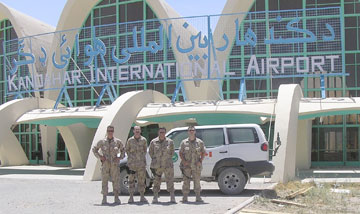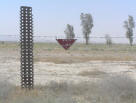|

Upon
arrival to Qandahar Airfield, one gets the sense of
the state of affaires as well as an appreciation of
the efforts of those that have come before.
Canadian modular tentage still stands in the
location of the old Canadian Headquarters, from OP
APOLLO in 2002. The road adjacent to the site
bears testament to the footprint that Canada has
left behind here.
The LO team has hit the ground running. As with any
Theatre Activation (TA), there are many challenges
and co-ordination issues. The activities mainly
comprise operational integration, force protection
frameworks, construction and the provision of
infrastructure and utilities, intelligence
interoperability factors, logistics, and many other
synchronization activities. The composition of the
team (with various expert backgrounds) gives it a
robustness to deal with the majority of
circumstances that arise in theatre. The team is
working very closely with their US counterparts in
order to establish a smooth transition from the
American run PRT to Canadian based operations. The
LO team is also the eyes and the ears of Canada and
the Canadian Forces and provide useful planning
input to planning teams back in Canada. They work
closely with their counterparts back in Canada at
the Joint Operations Group, Kingston. They also
liaise with Task Force Kabul within theatre. It’s a
busy time to be in Afghanistan these days. The LO
team is involved with supporting the establishment
of the PRT and assisting with the transition of
forces from Kabul to Qandahar. As well, there are
many players involved; It is very much a joint
effort in order to deploy troops into theatre.
|
(
Qandahar Minefield)
 From an engineering perspective, the mine,
improvised explosive devices (IED), and unexploded
ordinance (UXO) threat is quite real. Engineers
will be well-equipped and well-informed in order to
deal with these unique threats. Design and
construction of infrastructure in order to house and
protect CF members is one of the priority items for
the TAT. The procurement of building materials and
the availability of contractors in theatre is also a
concern; as these are scare within Qandahar.
Materials and equipment that can be sourced within
Afghanistan (and surrounding area) will lighten the
load associated with strategic airlift from Canada –
this will also provide a significant cost savings.
Potable water sources, sewage, waste disposal and
environmental issues are also of consideration and
have been addressed. Many Canadian construction
projects have already been identified and designed
by Engineers at the Joint Head Quarters in Kingston,
ON and 1 Engineer Support Unit in Moncton, NB,
respectively. Construction of this infrastructure is
the next step. For this purpose, a Specialist
Engineer Team (SET) and Construction Troop (CT) will
be used; these personnel will be flying into theatre
soon. QAF and the PRT location will never look the
same.
From an engineering perspective, the mine,
improvised explosive devices (IED), and unexploded
ordinance (UXO) threat is quite real. Engineers
will be well-equipped and well-informed in order to
deal with these unique threats. Design and
construction of infrastructure in order to house and
protect CF members is one of the priority items for
the TAT. The procurement of building materials and
the availability of contractors in theatre is also a
concern; as these are scare within Qandahar.
Materials and equipment that can be sourced within
Afghanistan (and surrounding area) will lighten the
load associated with strategic airlift from Canada –
this will also provide a significant cost savings.
Potable water sources, sewage, waste disposal and
environmental issues are also of consideration and
have been addressed. Many Canadian construction
projects have already been identified and designed
by Engineers at the Joint Head Quarters in Kingston,
ON and 1 Engineer Support Unit in Moncton, NB,
respectively. Construction of this infrastructure is
the next step. For this purpose, a Specialist
Engineer Team (SET) and Construction Troop (CT) will
be used; these personnel will be flying into theatre
soon. QAF and the PRT location will never look the
same.
The operations in Qandahar, unlike in Kabul, are
under the mandate of Operation Enduring Freedom.
The Provincial Reconstruction Teams operate within
this mandate until NATO Phase III expansion makes
its way into this region. The LO team looks forward
to receiving more Canadian troops here, in Qandahar,
in the near future. It has been invaluable to have
Canadian Liaison Officers working closely with their
American counterparts in order to set the conditions
for mission success.
It is great to see that Engineers are leading the
way. Chimo!
|